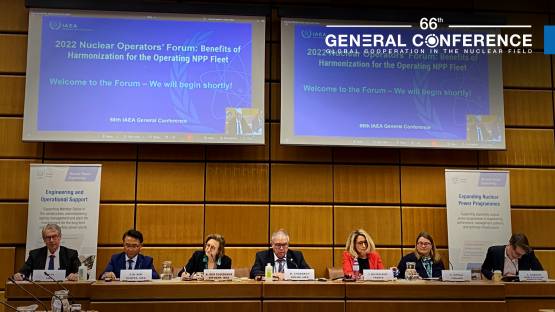Nuclear power plant (NPP) operators, faced with a high number of suppliers and differing standards of industrial parts, increasingly see harmonization of their interactions with the supply chain as key to the success of existing and future NPPs. Senior managers from across the industry discussed progress made on harmonization and challenges that remain at an event on the sidelines of the 66th IAEA General Conference today.
“Harmonization sounds like a buzz word, but it’s a reality today in the nuclear industry, whether we are talking about the existing NPP fleet or emerging technologies, such as small modular reactors (SMRs),” Mikhail Chudakov, IAEA Deputy Director General and Head of the Department of Nuclear Energy, said during the opening of the annual Nuclear Operators’ Forum. “The sustainability of the nuclear fleet, its economic and reliable operation, depends on operators successfully interacting with the supply chain.”
Nuclear power plants suppliers need to comply with well-established requirements and have a pool of their own suppliers and subcontractors that supply sub-assemblies, components and services. In addition, regulations differ across countries, while there may also be differing practices between operators and even between different parts of the same organizations.
Participants in the event said all these issues can be challenging to manage, sometimes leading to delays and cost overruns. However, by improving predictability and transparency in interactions between operators, suppliers and regulators, challenges can be overcome. Other industries such as aviation and petrochemicals have created models for this that may be viable also for nuclear, attendees heard.
To establish a reliable base of core suppliers and shorten the supply chain, speakers said cooperation and partnerships were more beneficial than making short-term contracts and changing suppliers—a practice that was previously more common. “The quality of the contractual relationship, the strengthening of the industrial capacity of the supply chain and the desire to simplify requirements and replicate standards will enable us to succeed in our projects tomorrow,” said Isabelle Nicoulaud, Project Leader of Supplier Relations at EDF in France.
Cooperation requires competence and proactive planning and management by all parties—operators, suppliers and regulators—both within their organizations and with one another, panellists said. This may also mean that traditional roles change, with operators taking on more responsibility in assuring the quality.
“Establishment of a dedicated organization and harmonization programmes is needed to support suppliers systematically and continuously,” said Kim Han Gon, President of the Central Research Institute KHNP in Korea. “Product standardization and supplier qualification are key strategies of our support programme.”







